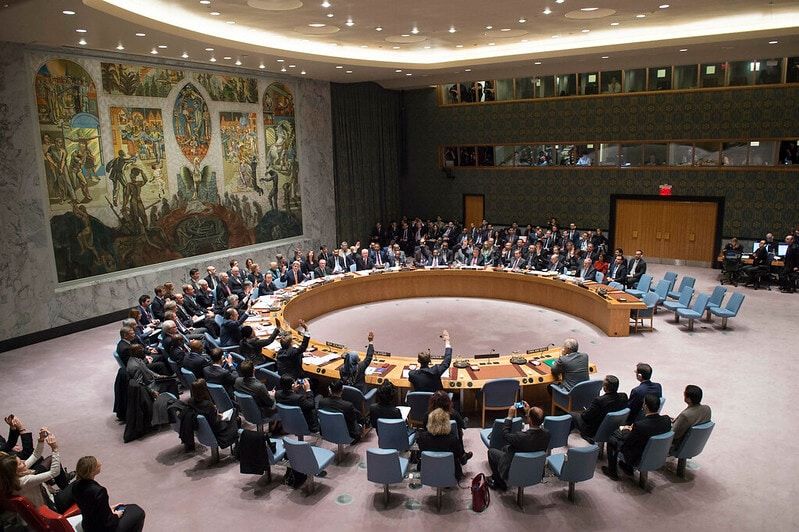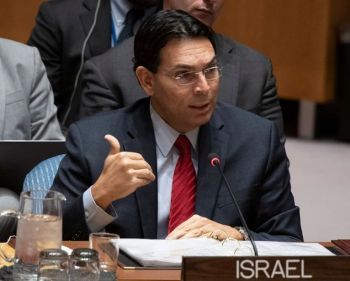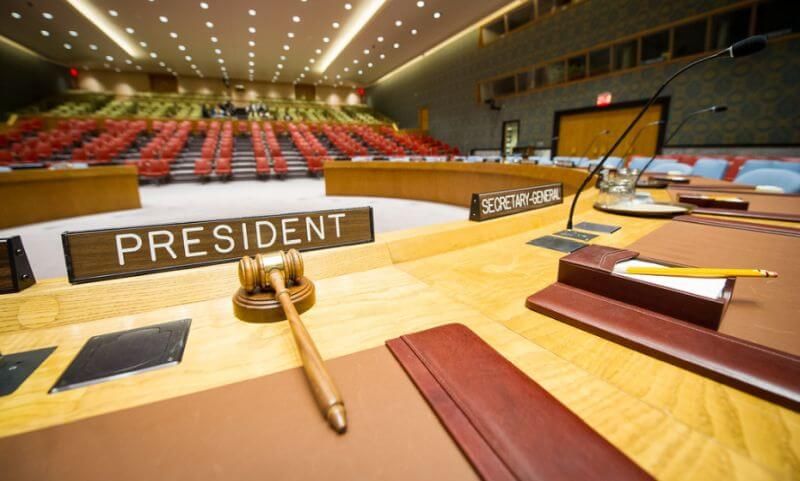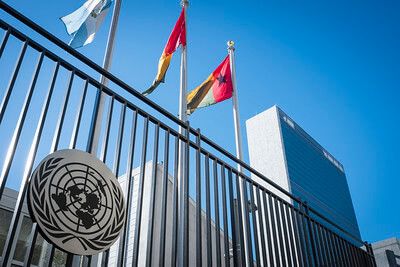Why does the United Nations Security Council treat Israel unfairly?
What’s behind the Council’s disproportionate number of resolutions criticizing Israel, and the Jewish state’s stymied efforts to get a seat on this powerful body?
How the Security Council Works
The United Nations is a complex institution with multiple organs composed of inter-related and sometimes inter-connected systems that constantly baffle outside observers, especially when it comes to Israel.
Six principal organs make up the UN: the General Assembly (GA), the Security Council (UNSC), an Economic and Social Council, a Trusteeship Council, the International Court of Justice and the UN Secretariat. Sitting at the top of the pyramid is the Security Council, “the most powerful and significant organ of the United Nations” charged with a heavyweight mission: “the maintenance of international peace and security.”
Join the fight for Israel’s fair coverage in the news
Founded in the wake of World War II in 1945, five countries are permanent members of the UNSC, each one with the controversial power to veto any UNSC decision: the United States, Russia (formerly the Soviet Union), China, France and the UK. The other 10 members of the Council are chosen from different world regions on a rotating basis, with five countries elected annually to serve a 2-year term.
Each member country serves as “president” of the UNSC for a month, so that despite the five permanent members, a perennial feature of the Council is its constantly changing membership.
One of the key tools at the disposal of the UNSC are the resolutions that can praise or condemn, send peacekeepers or impose sanctions. The resolutions are a powerful tool that paved the way for the First Gulf War against Iraq for its invasion and occupation of Kuwait, and the economic sanctions against Iran for its pursuit of nuclear weapons.
“Security Council resolutions are legally binding and are considered the most forceful vehicle for the articulation of the views of the international community,” says UN Watch.

No Seat for Israel
The Institute for National Security Studies at Tel Aviv University noted that having a seat and and having a turn chairing the Council “facilitates authority by association” because it “confers status and recognition on a state, increasing the prestige of its diplomats both in New York and around the world.”
But since its founding in 1948, Israel has never been a member of the Security Council, mostly due to the skewed voting system that favors regional blocs.
Related reading: Israel and the UN: A Good Relationship That Turned Toxic
“Though Israel has been a full member of the UN since 1949, for many years we were banned from joining our regional group of Asia-Pacific,” Israel’s UN Ambassador Danny Danon said. Instead, Israel is a temporary member of the Western European and Others Group.
The UNSC’s anti-Israel bias stands out when seeing that other countries from the Asia-Pacific group, including neighboring Jordan, Lebanon and Syria, have all twice been members of the Security Council.
The non-governmental organization (NGO) UN Watch noted that “countries that systematically vote against Israel and single Israel out for condemnation within the UN have been Security Council members, despite their own often less than pristine human rights records. Among these countries are Tunisia, Bangladesh, Malaysia, Syria, Pakistan, Algeria, Qatar, Libya, Lebanon, and Morocco.”

In 2013 Israel decided it would try to win a coveted seat on the Security Council for 2019-2020, recognizing it would take years of lobbying to achieve the two-thirds majority of the 193-member General Assembly. Danon admitted “we know this will not be easy,” but Israel “is qualified, well equipped and well prepared for this important role.”
During diplomatic efforts in 2017, Danon said that Israel continued to face more bias at the United Nations, but that a vote to put Israel on the Security Council would be a “strong statement finally accepting the Jewish state as a full and equal member.”
However, Israel withdrew from the race in 2018 realizing that the political bloc of the 120-member Non-Aligned Movement would likely vote for Germany and Belgium to block Israel. Palestinian Authority diplomats had waged a behind-the-scenes campaign to keep Israel off of the UNSC.
“We are doing everything possible to convince as many countries as possible to block the vote on Israel’s bid for a seat at the Security Council,” said PA Foreign Minister Riyad al-Malki.
Related reading: Israel and the Dysfunctional UN Human Rights Council
Disproportionate Focus on Israel
While ostensibly acting to protect the people of the world from future armed confrontations, an examination shows that the Security Council has spent a disproportionate amount of its time passing resolutions condemning Israel. The UNSC’s obsession with Israel amounts to hundreds of resolutions, more than any other UN member and more than any of the armed conflicts since 1945 in the world that have claimed millions of innocent lives.
As UN Watch executive director Hillel Neuer put it,
“Examination of the Security Council’s record reveals unambiguously that Israel is often condemned, that the Palestinians receive uniquely favorable treatment, that violence against Israel is often ignored, and that a host of major human rights abuses around the world escape comment.”

Can the Security Council Be Reformed?
Over the years there have been repeated calls to reform how the UNSC works, with former Secretary-General Kofi Annan proposing changes in 2005 – yet nothing came of it. The Council’s failures do not stem from its being yet another UN body hijacked by an anti-Israel agenda, but from its makeup based on the world order in 1945 and an inability to update itself over the past 50 years.
“The (Security) Council is a fascinating but often frustrating institution. Thanks to increased monitoring by NGOs and the media, citizens know more today about the Council’s work than in the past, but the Council still falls far short on accountability, fairness and effective action.”
Related reading: How the Palestinians Manipulate the International Criminal Court
The Japan-based United Nations University is a global think tank and the academic and research arm of the UN. Since the UNU’s founding in 1992, it has attempted to be a bridge between institutes of higher learning and the UN, in a bid “to resolve the pressing global problems” that face the world body. However, in a damning self-indictment on its own website, the UNU concludes that the Security Council is not just politicized, but that “the Council cannot be expected to be impartial, apolitical, and democratic.”
“The Council is not a disinterested and apolitical institution. The Council is, first and foremost, a political body, beholden to the political processes of collective decision-making … Each (council) decision is, therefore, reflective of the overlapping interests of the membership and also the level and quality of agreement that could be reached among them.”
 The Security Council Report, an NGO that independently monitors Council functions, noted that the “discord among the members” ends up being a “game” in which political values, not the UN charter, sets the tone for behavior.
The Security Council Report, an NGO that independently monitors Council functions, noted that the “discord among the members” ends up being a “game” in which political values, not the UN charter, sets the tone for behavior.
“This discord among the members also plays out in a normative setting and leads to a contestation over values and around the Council’s goals, role and agenda. This contestation could be viewed as an important game within the Council, which constructs the Council as a place in which its members argue about what the world order should look like.”
Given previous admissions by UN leaders that the organization is biased against Israel, it’s no wonder that Israel faces an ongoing uphill diplomatic battle in dealing with the Security Council.
Related reading: The UNRWA Refugee Controversy Explained
Plagued by the same innate biases that affect other UN bodies, the UN Security Council is more of a popularity club than what it’s supposed to be: a serious and austere world body working to keep the peace and prevent war. In 2016 the respected Simon Wiesenthal Center called an anti-Israel Security Council Resolution one of the “Ten Worst Anti-Israel/Anti-Semitic Incidents” of 2016.
It is unfortunate that the UN’s top body, which is supposed to be moving the world forward peacefully, appears to suffer from the same inability of the rest of the United Nations to maintain an unbiased approach to its daily business – especially when it comes to Israel.
Enjoyed reading this article? Follow the Israel In Focus page on Facebook to read more articles explaining Israel’s history, politics, and international affairs. Click here to learn more!
Featured image: CC BY Nicolas Raymond, Nicolas Raymond and Pixabay; Security Council CC BY-NC-ND United Nations Photo; Council chamber via UN Photo flags CC BY-NC-ND UN Photo;< fl

